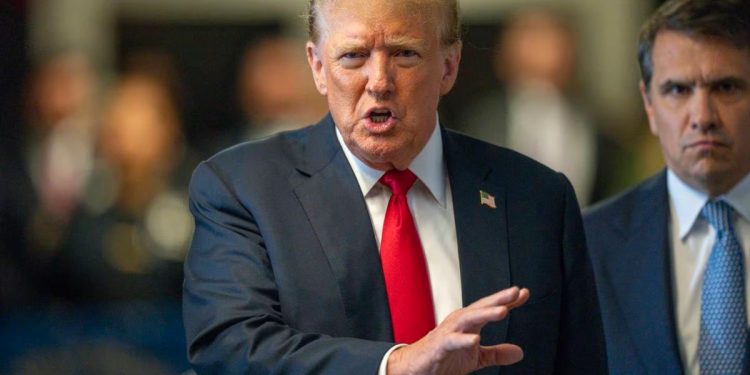The closing arguments in Donald Trump’s New York City hush-money trial began with defense attorney Todd Blanche’s lengthy and convoluted address, which lasted over three hours. During a lunch break following the pitch, the judge in charge of the case chastised the former president’s counsel for an inappropriate reference to punishment.
The narrative premise presented to jurors was that Michael Cohen, 57, the state’s star witness, could not be trusted.
The defense reminded the assembled Manhattan arbiters of the fact that Cohen was an admitted serial liar—using a permutation of the acronym G.O.A.T. to call Cohen the Greatest Liar of All Time—and claimed that Cohen committed several instances of perjury during the trial, lying to each and every juror in order to implicate Trump and shore up other pieces of his, at times uneven, testimony.
“You cannot send someone to prison or convict someone based on Michael Cohen’s words,” Blanche remarked, concluding his sentence over a lengthy argument from the prosecution.
Assistant District Attorney Joshua Steinglass filed a petition for curative instruction after the jury left for lunch and only the lawyers and the judge remained in the courtroom, allowing the defense to continue their closing argument without further interruption.
According to a courtroom report from CBS News, the objecting prosecutor described the defense’s reference to prison as a “blatant and wholly inappropriate effort to gain sympathy” for Trump.
Steinglass remarked, “There’s no requirement of prison,” according to Just Security fellow Adam Klasfeld’s study.
More legal and criminal coverage: ‘Are you missing my point?’: Trump’s attorney is sternly reprimanded by the judge after the jury leaves a hush-money trial.
Acting New York Supreme Court Justice Juan Merchan concurred with the prosecution, calling the statement “outrageous” and stating it was unlikely to be an accident on Blanche’s behalf.
“You know that making a comment like that is highly inappropriate,” the judge continued. “It’s simply not allowed.”
Merchan granted the instruction, instructing the jurors to inform them of the defense’s error once they returned from lunch.
Assistant District Attorney Susan Hoffinger stated that the defense was explicitly on notice about mentioning potential punishment due to a pretrial ruling the court issued in March that discussed—and expressly prohibited—exactly that topic.
“The defendant is precluded from… making arguments and introducing evidence regarding any potential punishment or other consequences for the defendant as a result of these proceedings,” the order stated.
Blanche did not disagree with the curative instructions.
The court, in turn, instructed the jury that they could not consider prospective punishment when making their judgment, emphasizing that a prison term is not a requirement of a conviction on the counts at hand.
While prison is technically an option in this case, there is no assurance that Trump will face it if convicted.
According to New York law, a Class E nonviolent felony is the least serious felony. First-time offenders, such as Trump, are likely to face no jail time, probation, or sentences ranging from one to four years in prison.










